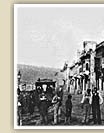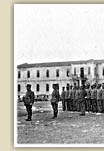
The initiative belonged in the first place to the National Defence of Constantinople and aimed
at creating an autonomous Ionian state in Asia Minor. In October of that same year
the Asia Minor Defence, an organization of Smyrna similar to that of Constantinople, had contacts
with Aristeidis Stergiadis and Anastasios Papoulas, the support of whom had been deemed
a basic factor for the promotion of the plan. Stergiadis was not in favour of these first soundings
of the Asia Minor Defence. By contrast, Papoulas demonstrated more enthusiasm,
declaring at the same time that he would proceed no further without the consent of
Athens.
In February 1922, in a second phase of contacts of the Defence with Papoulas,
the latter was offered the leadership of the movement for the autonomy of Ionia. Papoulas accepted,
advocating once more the necessity of getting the financial and military support of Athens, without which
there was no hope of success. Representations to Athens, however, were of no avail. At the same time,
the advice of Venizelos was sought concerning the handling of the whole affair. He advised
that the whole venture lean towards the creation of an Asia Minor and not an Ionian state, whose character should be Christian and Asia Minor rather than exclusively Greek, under the sovereignty
of the Sultan.
|
 |

He emphasized the fact that the Entente could decide on the definitive fate of the area
and advised the winning over of Aristeidis Stergiadis. Eventually, the whole affair of an
autonomous state did not bear fruit.
Lastly, in July 1922, in an ultimate effort to save the Greek population,
Stergiadis himself proposed to the British Foreign Office, with the consent of Constantine and
the cabinet, the creation of an Asia Minor State - not of a Christian character as Venizelos had
advocated in March but exclusively an Asia Minor state, with an equal participation of the native Muslim element in the
administration. The weak point of this third plan
was the need for military support of the new state by Greek forces, who would remain as
volunteers after the departure of the Greek troops. The 'universal demonstration' organized
by Stergiadis disclosed that both the disbelief of the Muslim element and the opposition of the
Asia Minor Defence gave Stergiadis' proposal little appeal with public opinion.
The failure of the plan was related mostly to the attitude of the Great Powers, which rejected the
idea of Asia Minor autonomy.
|
 |
